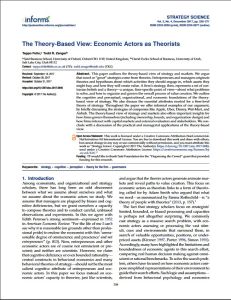Join getAbstract to access the summary!

Join getAbstract to access the summary!
Teppo Felin and Todd R. Zenger
The Theory-Based View: Economic Actors as Theorists
INFORMS, 2017
What's inside?
Great strategy depends on a great theory.
Recommendation
Traditional economic theory assumes that economic actors have all the information they need and will make rational decisions. If that were the case, differences in strategy would merely result from different initial positions or luck. Professors Teppo Felin of Oxford University’s Saïd Business School and Todd Zenger of the University of Utah don’t subscribe to that view but posit that varying strategies are the result of different perceptions. They see entrepreneurs and other economic actors as scientists generating hypotheses and experiments. In their paper in Strategy Science, Felin and Zenger argue that successful strategies arise from good theories. Managers and entrepreneurs might find this scholarly paper a bit academic, but they’ll appreciate its contrarian perspectives and practical insights.
Summary
About the Authors
Teppo Felin is a professor of strategy at the Saïd Business School, University of Oxford. Todd Zenger is the N. Eldon Tanner Professor of Strategy and Strategic Leadership at the David Eccles School of Business at the University of Utah.

















Comment on this summary